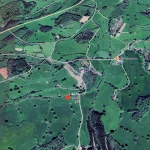UPDATE2 ViaSat and Inmarsat UK Fight Over Satellite Broadband for Airplanes
Inmarsat’s plan to improve broadband connectivity on aircraft appears to have taken a hit today after rival Satellite operator ViaSat accused the London-based ISP of “misusing spectrum” and gaining an “unfair competitive advantage” by “creating a monopoly for European in-flight connectivity.”
At present the European Commission has already granted Inmarsat a broadband spectrum license to run Mobile Satellite Services (MSS), which have a specific focus on rural broadband coverage and emergency services. Since then Ofcom has proposed to authorise new terrestrial base stations, which could allow Inmarsat to run “direct air-to-ground” MSS connectivity to aircraft via the 2GHz band (here).
The regulator’s proposal would support a change in the use of spectrum with respect to Inmarsat’s complementary ground-based network (CGC), which will make use of both its Satellites and their ground-based DA2G links to the aircraft. The effort has previously won the support of British Airways (BA) and other airlines.
Advertisement
Inmarsat says they’re “on track” to make their new European Aviation Network (EAN) operational during H2 2017. However ViaSat, which is supported by partner Eutelsat, have complained that Inmarsat is not using the spectrum for its original purpose. Both operators feel that this is unfair because they could offer similar services but “weren’t able to bid” on the license because at the time it was not introduced for the new purpose.
Rick Baldridge, ViaSat president and COO, told ISPreview.co.uk:
“Spectrum is an exclusive asset and unique resource. ViaSat believes Inmarsat violated Pan-European government authority by seeking to substitute its own judgement for that of the European authorities and, in effect, unilaterally re-write the original license it was granted under the ‘MSS Decision’. Allowing Inmarsat to keep this valuable spectrum resource for their European Aviation Network terrestrial service results in a massive public subsidy to one company; which gives Inmarsat a natural monopoly with major Pan-European business advantages based on unfair competition.
ViaSat believes Inmarsat’s illegal actions will do long-term damage to free competition across Europe – especially in the in-flight Wi-Fi market. The lack of competition will trickle down to affect consumer wallets; choice and broadband experiences: where an absence of industry competition encourages consumer price gouging and a lack of innovation and technological advancement.
Currently, ViaSat and others have done all they can to alert the relevant regulators and parties as to what we believe is a misuse of a spectrum license granted to Inmarsat. The intent for the spectrum was to be used for satellite services; however, Inmarsat has used the license to create a terrestrial-based European Aviation Network.
We’ve outlined our objections to Ofcom in the UK, and have done the same with the equivalent regulators in Germany and other Member States, after which there are four possible outcomes. The European Commission may issue a ruling to allow or deny Inmarsat to use the license in this manner, it may start the process again and reopen the tender process to include other vendors or the final option would be to defer to each individual member state and allow them to rule on the matter, although this would considerably devalue the license; as well as potentially create a “swiss cheese” effect with mixed coverage across the continent.”
ViaSat claims that “multiple legal proceedings” are already ongoing throughout Europe, which could result in European member states (Germany and the UK among the first) denying Inmarsat approval for their EAN, or limiting how they can use the network. Obviously that’s bad news for Inmarsat, which has by now spent a huge amount of money on development of the new system.
At the same time it’s worth remembering that both of the existing licence holders (Inmarsat and EchoStar) have historically been very slow to make proper use of the spectrum, which in recent years has caused plenty of frustration. In that sense Ofcom’s proposal to support a change of use would have helped but clearly not everybody is happy with the approach that has been taken.
We’ve contacted Inmarsat for comment and are awaiting their reply.
Advertisement
UPDATE 1:52pm
We would have published this sooner but the Budget 2017 got in the way.
An Inmarsat Spokesperson told ISPreview.co.uk:
“Inmarsat was awarded the spectrum by the EU and, in conjunction with our partner Deutsche Telekom, we are rolling out the European Aviation Network (EAN) to fulfil the mandate we have been given.
We continue to operate in full compliance of the award granted to us and therefore the EU is fully supportive and all the member states have either issued or are in the process of issuing the relevant licenses, in accordance with the agreed procedure.
We are on course to launch the EAN service in 2017, following the launch of our European-built EAN satellite on an Arianespace rocket in Q2.
EAN will deliver a unique service for European airlines and European passengers. It will provide Europe with technological leadership in an important new sector, and give Inmarsat and Deutsche Telekom a strongly differentiated offer in terms of the unparalleled quality and reliability our new service will provide.”
UPDATE 29th June 2017
The President & COO of ViaSat, Rick Baldridge, has just given an update on their progress and we’ll paste it below. ViaSat’s objections are also being supported by Eutelsat and Panasonic.
Advertisement
– What is the specific issue with Inmarsat’s actions?
The intent for the spectrum was to be used for satellite services; however, Inmarsat has used the license to create a terrestrial-based European Aviation Network – what we believe is a misuse of a spectrum license granted to Inmarsat. Spectrum is an exclusive asset and unique resource. ViaSat believes Inmarsat violated Pan-European government authority by seeking to substitute its own judgement for that of the European authorities and, in effect, unilaterally re-write the original license it was granted under the ‘MSS Decision’. Allowing Inmarsat to keep this valuable spectrum resource for their European Aviation Network terrestrial service results in a massive public subsidy to one company; which gives Inmarsat a natural monopoly with major Pan-European business advantages based on unfair competition.
ViaSat believes Inmarsat’s actions will do long-term damage to free competition across Europe – especially in the in-flight Wi-Fi market. The lack of competition will trickle down to affect consumer wallets; choice and broadband experiences: where an absence of industry competition encourages consumer price gouging, a lack of innovation and technological advancement, and ultimately a substandard service for consumers.
– What objection(s) has ViaSat filed, and what have the results been?
ViaSat brought an action to the European Commission’s General Court in Luxembourg on April 24, 2017: claiming that the European Commission should have acted to prevent national regulators from authorising the use of the 2GHz band for terrestrial air-to-ground purposes, instead of for a mobile satellite services “MSS” satellite network in accordance with EU law. The Commission has told ViaSat that:
– 1) No decision has been taken by the commission on any MSS authorisation request
– 2) national regulators must ensure that Inmarsat’s use of the 2 GHz band is complaint with the legal framework for use of the 2 GHz band for MSS
– 3) Should milestones not be respected, those national authorities have to consider taking further enforcement action, in line with national and EU law
– What contact has ViaSat had with national regulators?
ViaSat has already contacted a number of national regulators, including Ofcom in the UK and Arcep in France. A number of national regulators (NRAs) have already expressed the same types of concerns that ViaSat is raising. NRA concerns include:
– The framework for MSS does not allow a scenario in which the complementary ground components (CGC) have a dominant role
– Excessive use of CGCs and at the same time a potential increase in the data transmission capacity of the actual MSS system is not within the scope of the current regulatory framework
– Competition aspects need to be considered
– The proposed definition of Aero CGC (i.e. to support the EAN) is not in line with the definition of CGC in the EC decision and ECC decision
– Will this stop the Inmarsat service going live as scheduled?
We expect that national regulators will apply, and enforce, the law, as the European Commission said they must do
– What are ViaSat’s next steps?
We will continue our approaches to the EC and national regulators to resolve the situation.
Mark is a professional technology writer, IT consultant and computer engineer from Dorset (England), he also founded ISPreview in 1999 and enjoys analysing the latest telecoms and broadband developments. Find me on X (Twitter), Mastodon, Facebook, BlueSky, Threads.net and Linkedin.
« UK ISP Plusnet Shaves a Few More £ off their “Fibre Broadband” Prices

















































Comments are closed